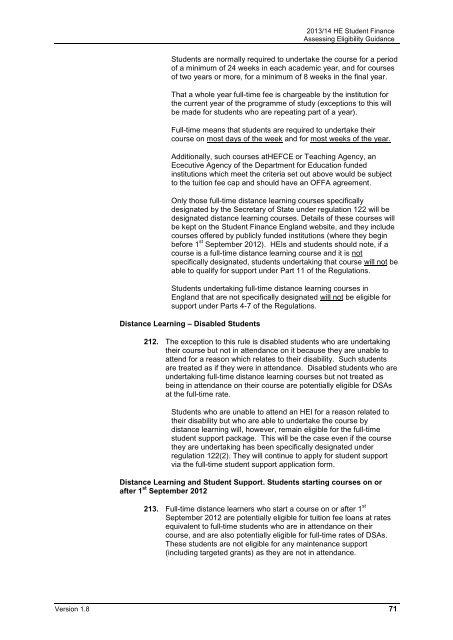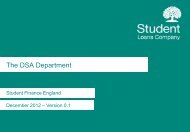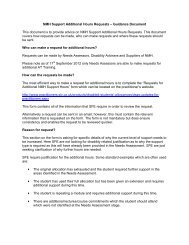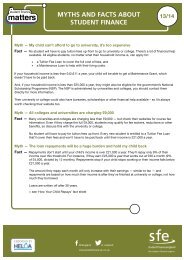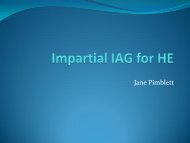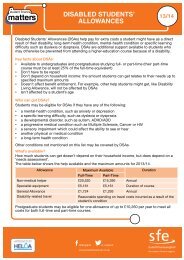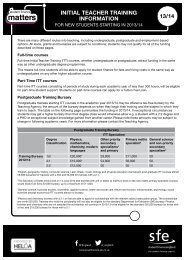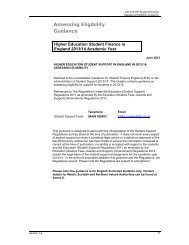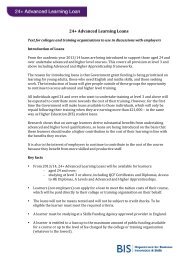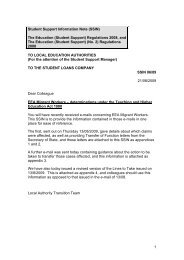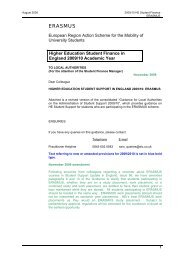SFE Assessing Eligibility Guidance 2013/14 - Practitioners - Student ...
SFE Assessing Eligibility Guidance 2013/14 - Practitioners - Student ...
SFE Assessing Eligibility Guidance 2013/14 - Practitioners - Student ...
Create successful ePaper yourself
Turn your PDF publications into a flip-book with our unique Google optimized e-Paper software.
<strong>2013</strong>/<strong>14</strong> HE <strong>Student</strong> Finance<br />
<strong>Assessing</strong> <strong>Eligibility</strong> <strong>Guidance</strong><br />
<strong>Student</strong>s are normally required to undertake the course for a period<br />
of a minimum of 24 weeks in each academic year, and for courses<br />
of two years or more, for a minimum of 8 weeks in the final year.<br />
That a whole year full-time fee is chargeable by the institution for<br />
the current year of the programme of study (exceptions to this will<br />
be made for students who are repeating part of a year).<br />
Full-time means that students are required to undertake their<br />
course on most days of the week and for most weeks of the year.<br />
Additionally, such courses atHEFCE or Teaching Agency, an<br />
Ececutive Agency of the Department for Education funded<br />
institutions which meet the criteria set out above would be subject<br />
to the tuition fee cap and should have an OFFA agreement.<br />
Only those full-time distance learning courses specifically<br />
designated by the Secretary of State under regulation 122 will be<br />
designated distance learning courses. Details of these courses will<br />
be kept on the <strong>Student</strong> Finance England website, and they include<br />
courses offered by publicly funded institutions (where they begin<br />
before 1 st September 2012). HEIs and students should note, if a<br />
course is a full-time distance learning course and it is not<br />
specifically designated, students undertaking that course will not be<br />
able to qualify for support under Part 11 of the Regulations.<br />
<strong>Student</strong>s undertaking full-time distance learning courses in<br />
England that are not specifically designated will not be eligible for<br />
support under Parts 4-7 of the Regulations.<br />
Distance Learning – Disabled <strong>Student</strong>s<br />
212. The exception to this rule is disabled students who are undertaking<br />
their course but not in attendance on it because they are unable to<br />
attend for a reason which relates to their disability. Such students<br />
are treated as if they were in attendance. Disabled students who are<br />
undertaking full-time distance learning courses but not treated as<br />
being in attendance on their course are potentially eligible for DSAs<br />
at the full-time rate.<br />
<strong>Student</strong>s who are unable to attend an HEI for a reason related to<br />
their disability but who are able to undertake the course by<br />
distance learning will, however, remain eligible for the full-time<br />
student support package. This will be the case even if the course<br />
they are undertaking has been specifically designated under<br />
regulation 122(2). They will continue to apply for student support<br />
via the full-time student support application form.<br />
Distance Learning and <strong>Student</strong> Support. <strong>Student</strong>s starting courses on or<br />
after 1 st September 2012<br />
213. Full-time distance learners who start a course on or after 1 st<br />
September 2012 are potentially eligible for tuition fee loans at rates<br />
equivalent to full-time students who are in attendance on their<br />
course, and are also potentially eligible for full-time rates of DSAs.<br />
These students are not eligible for any maintenance support<br />
(including targeted grants) as they are not in attendance.<br />
Version 1.8 71


